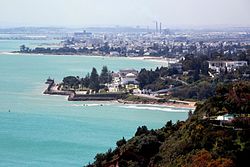Sidi Bou Said
This article needs additional citations for verification. (September 2014) |
Sidi Bou Saïd
سيدي بو سعيد | |
|---|---|
Suburb | |
 Carthage Palace from Sidi Bou Said | |
| Coordinates: 36°52′N 10°20′E / 36.867°N 10.333°E | |
| Country | |
| Governorate | Tunis Governorate |
| Government | |
| • Type | Unitary Semi-Presidential Republic |
| • Mayor | Raouf Dakhlaoui [1] |
| Population (2014) | |
| • Total | 5,911 |
| Time zone | UTC1 (CET) |
| Area code(s) | 36° 52′ 0″ N, 10° 20′ 0″ E |
Sidi Bou Said (Arabic: سيدي بو سعيد ) is a town in northern Tunisia located about 20 km from the capital, Tunis.[2]

Named for a religious figure who lived there, Abu Said al-Baji, it was previously called Jabal el-Menar. The town itself is a tourist attraction and is known for its extensive use of blue and white. It can be reached by a TGM train, which runs from Tunis to La Marsa.
History
In the 12th century/13th century AD Abu Said Ibn Khalaf Yahya al-Tamimi al-Beji arrived in the village of Jabal el-Menar and established a sanctuary. After his death in 1231, he was buried there. In the 18th century Turkish governors of Tunis and wealthy citizens of the latter built residences in Sidi Bou Said.
During the 1920s, Rodolphe d'Erlanger applied the blue-white theme all over the town.[citation needed] His home, Ennejma Ezzahra, is now a museum that has a collection of musical instruments, and organizes concerts of classical and Arabic music.[3]
Famous people
Sidi Bou Said has a reputation as a town of artists.[4][5] Artists who have lived in or visited Sidi Bou Said include famous occultist Aleister Crowley, Paul Klee, Gustave-Henri Jossot, August Macke and Louis Moillet. Tunisian artists in Sidi Bou Said are members of École de Tunis (painting school of Tunis), such as Yahia Turki, Brahim Dhahak and Ammar Farhat. French philosopher Michel Foucault lived there for a number of years while teaching at the University of Tunis.[6][7] French author Andre Gide also had a house in the town.
Former Tunisian President Beji Caid Essebsi was born in Sidi Bou Said.[8]
Azzedine Alaïa had a house in Sidi Bou Said which is now transformed into an art gallery.[9]
Gallery
-
Typical street with white walls and blue window shades
-
Café de Nattes and souvenir shops
-
August Macke Sidi Bou Said painting "View into a Lane" 1914
-
Paul Klee visited Sidi Bou Said in April 1914
References
- ^ Report: Interview with the Mayor of Sidi Bou Saïd
- ^ Kerrou, Mohamed. "Remembering Essebsi, the late maestro of Tunisian politics". The Conversation. Retrieved 2020-05-26.
- ^ "Top 20 sites in Tunisia". BonAdvisor.
- ^ "Sidi Bou Saïd artists village - Tunisia". www.nachoua.com. Retrieved 2020-05-26.
- ^ Millard, Leigh (2017-08-30). "A Piece of Paradise on Africa's Northern Coast". Fathomaway.com. Retrieved 2020-05-26.
- ^ "Foucault, Michel | Internet Encyclopedia of Philosophy". www.iep.utm.edu. Retrieved 2020-05-26.
- ^ "Michel Foucault | French philosopher and historian". Encyclopedia Britannica. Retrieved 2020-05-26.
- ^ "Tunisian President Beji Caid Essebsi dies aged 92". France 24. 2019-07-25. Retrieved 2020-05-26.
- ^ Patate, Ze Brune. "La demeure tunisienne de Azzedine Alaia transformée en galerie d'art". FFDesigner (in French).
External links
- About Sidi Bou Said in general
- Lexicorient
 Sidi Bou Said travel guide from Wikivoyage
Sidi Bou Said travel guide from Wikivoyage





